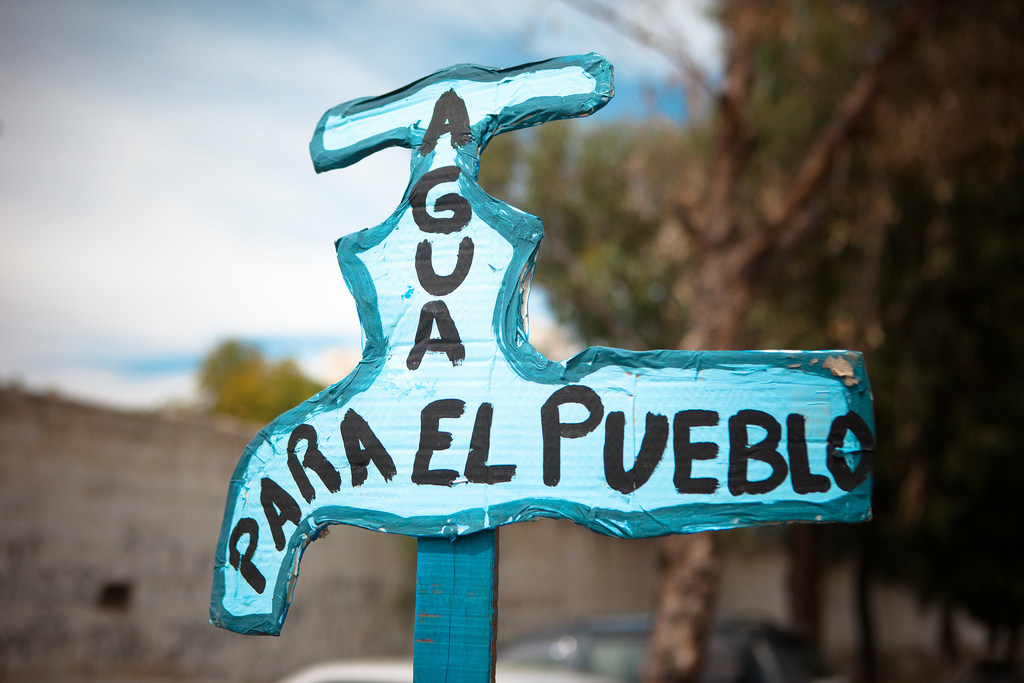
In May 2000, a Fortune Magazine piece claimed triumphantly that the “liquid everybody needs – and will need a lot more of in the future – is going private,” and as a result would benefit “multitudes of poor people.” Fortune’s senior editor, Shawn Tully, painted a Dickensian picture of Buenos Aires’s failing public water system which, thanks to its sale to Suez, had its magnificent fountains “spouting anew.”
The privatization puff-piece promised that from “Atlanta to New Delhi,” private corporations “offered what budget-strapped cities can't: the cash to upgrade that rusting infrastructure.” Best of all, for the magazine's mainly wealthy readers looking for new stock market options, water privatization promised “one of the world's great business opportunities.”
The promise of water for the poor and profits for the rich was an alluring one, soon touted by everyone from corporations to the World Bank to government aid agencies. Here at last was a magic bullet that could help expand water services to those without water in developing countries and help pay for upgrades to aging water infrastructure in developed countries.
Water was just one of many public sectors, from energy to health, that could be transformed by privatization. The fact that one month earlier, in April 2000, the people of Cochabamba, Bolivia, rose up and threw out the construction giant Bechtel for its unwanted takeover of their water services was considered an exception – the result of the California corporation unwisely “raising prices too much.”
But Cochabamba was not a one-off; it was in fact the start of a global rebellion that is reversing the tide on privatization and is sure to have an impact that ripples well beyond water utilities.
A new report by Transnational Institute, "Here to Stay – Water Remunicipalisation As a Global Trend," unveils a growing tide of cities taking back control of their water. Only a few involved popular rebellions, but all resulted from growing dissatisfaction with corporations’ broken promises: investments that never materialized, surging tariff rates and lack of accountability and transparency.
As a result, an astonishing 180 cities from 35 countries have, in the academic jargon, "remunicipalised." And the rate is accelerating dramatically.
Among them, noticeably, are several of the cities Tully and others heralded as the promising pioneers of privatization. Buenos Aires, despite the apparent wonders of its gushing, privately-financed fountains, decided in 2006 to remunicipalise its water. Revelations that the Suez-led consortium failed to make 57% of its promised investments and therefore completely missed its connections targets – leaving 800,000 people without water and more than a million without sewerage services – left the city with little option but to end its disastrous experiment.
Its public successor, AySA, has managed to connect 700,000 new households since the remunicipalisation and dramatically improved working conditions. Part of its success lies with an invigorated public ethos that encourages worker-community partnerships, in which workers of the newly created public company AySA have collaborated directly with marginalized communities to expand the network.
Atlanta, Georgia, provides an even starker case of journalists imbibing corporate marketing speak when it comes to privatized water. Tully described the city as “ingenious” for privatizing its water because it promised 50% savings for the public and double-digit growth for the private company United Water. What could possibly go wrong? A lot, as it turned out.
As soon as United Water took over Atlanta’s water system in 1999, the company halved the workforce and then increased tariffs year-on-year. Water quality declined so markedly that on some occasions city residents were forced to boil their water after orange and brown liquids spewed from residential taps. Eventually, Atlanta had to hire its own inspectors to audit United Water’s work, costing the city an additional $1 million. Public anger led Mayor Shirley Franklin to cancel the contract in 2003 and return water services to city management after only four years of United Water’s 20-year contract.
Most noticeably and symbolically, the remunicipalisation revolution is strongest in France, the country with the longest history of water privatization and home to the world’s leading water multinationals, Suez and Veolia.
Starting with eight cases in the years 2005 to 2009, remunicipalisation has since accelerated dramatically across the country, with 33 cases since 2010 and many more expected in the next few years. The experience of Grenoble and Paris, which succeeded in increasing investments in maintenance and infrastructure renewal while lowering or stabilizing tariff rates, undermined the core argument made by privatizers: that their model was more efficient and cost-effective. Those claims were always nonsense, as various academic studies have shown that private water services are often more expensive and less efficient than public water services.
The fact is that private companies’ duty to their customers is nearly always superseded by its duty to reward its shareholders – which means that money that should go into reinvesting in networks often ends up fueling profits and dividends.
Solutions to a Global Water Crisis
Now that Suez and Veolia have lost the argument at home, where French local authorities and citizens have experienced their mistakes first-hand, it is only a matter of time before the model France exported around the world dies its death elsewhere, too.
Perhaps most importantly, though, cities taking back control of their water aren't merely seeking to return water services to their former status quo. Many remunicipalised water services are experimenting with new forms of citizen participation to encourage greater accountability and better services, too. In Paris and Grenoble, civil society representatives sit on the board and also have a citizens observatory to monitor and engage with the utility’s strategic decisions on investment, technology options and tariff setting.
No longer constrained by financial considerations alone, other public water utilities are seeking to link up in public-public partnerships in order to share learning and improve water services. In 2005, for example, the Mozambique government started a non-profit water operator partnership (WOP) between four small cities in the south of the country with Vitens Evides International (VEI) in the Netherlands. The aim of the partnership was to create autonomous water utilities by enhancing the capacity of local staff and management. These partnerships have now extended to eight other cities in Mozambique and represent a viable approach to strengthening local capacity to provide water services.
Achieving the goal of providing clean, affordable water to all is still a long ways off – and reversing water privatization is not an easy process. Many remunicipalised utilities have had to pay corporations millions of dollars in compensation in order to take back their water supply, and are therefore cash-strapped from the beginning. Cities everywhere face the challenge of transforming a corporate culture that prioritizes managing directors over workers, profits over investment, and shareholders over customers.
Some remunicipalised utilities have also failed to deliver on their promises, and the public's expectations, of change. However, the fact that 180 cities, knowing the risks, have embraced remunicipalisation shows that the mistaken experiment with privatization has ebbed and is now in the process of flowing away. It also means that populations around the world can begin to end ideological, free market fantasies and instead focus on how to make public services – which still provide 90% of the world’s water – work effectively so as to guarantee the human right to water for everyone.
3 WAYS TO SHOW YOUR SUPPORT
- Log in to post comments












